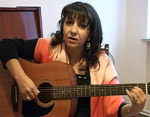A Musician’s Life in Shushi
 Julia says she’ll never leave Artsakh By Knar Babayan A few years ago she would elicit puzzled stares from people on the streets of Shushi. First, she walked with a guitar strapped across her shoulder. Then again, she would hum a melody just loud enough for passerby to pick up.
Julia says she’ll never leave Artsakh By Knar Babayan A few years ago she would elicit puzzled stares from people on the streets of Shushi. First, she walked with a guitar strapped across her shoulder. Then again, she would hum a melody just loud enough for passerby to pick up.
Attitudes have changed over the years. Now they all know her along Shushi’s streets. People stop to say hello and ask her how she’s doing. Julietta Aroustamyan, or Julia as her close friends call her, is a singer and works at the Shushi Children’s Music School. When the school first opened, she taught piano and vocal at the same time. For the past ten years she has served as the director of the Shushi Traditional Instrumental Ensemble. “I was in the sixth grade when my older sister got a seven string guitar as a gift. My sister really never played, but I removed one of the strings and turned it into a six string instrument. Since I’ve always been attracted to complex music, I started to doodle and write some songs and play them. Back in the sixth grade I wrote a song based on the lyrics of a poem that appeared in the children’s magazine. My first audience consisted of my sisters and their friends. They would come to the house and beg me to sing for them,” recounts Julia. Slowly, Julia fell in love with the guitar and the magical music it could produce. The instrument became here inseparable friend during difficult times. Julia confesses that during intimate moments she would tell things to her guitar that she wouldn’t even dare speak to her own mother. Julia was born in Mingachevir, a town in northern Azerbaijan. She received her musical education there, first at the local school’s piano department and later at the Kirovakan Music Institute’s vocal division. On November 26, 1988, Julia packed her bags and left Mingachevir with her family. They resettled in their ancestral village of Haterk, Artsakh. Not able to cope with village life, the family moved to Stepanakert, the capital. “In Stepanakert we lived in a student dormitory until the place was shelled by the Azeris. We then resided in Kirovakan for nine months,” recounts Julia. Immediately after the liberation of Shushi, Julia set off on foot from Stepanakert to Shushi with her child in her arms. She’s been living and working in the ancient fortress town ever since. Julia’s friends and acquaintances are the ones lucky enough to sing her own songs since she’s never had the chance to appear on larger stages. “In 1994 I represented Artsakh at the Yeghegnadzor Complex Musical Festival, coming in 3rd place. I won top prize at a similar competition that took place in Artsakh in 20002,” Julia said. She laments the fact that there aren’t more such festivals even though all the conditions exist in Artsakh to organize them. She argues that such events would increase interest in the country and that intricate music would develop as well. It would be great for performers and audiences alike. “There’s a limit to playing for friends in the kitchen. A song is much like a newborn; the proud mom wants to show how cute the child is to all. A songwriter also wants others to hear and appreciate their work. Many talented people are forced to leave Artsakh; at least to get established in their chosen field. Too bad it has to be this way,”Julia says Concurrent with her job, Julia has created a music studio where she teaches kids what she knows. Julia has written more than thirty songs. She says that her Russian education doesn’t prevent her from writing lyrics in Armenian. She was kind enough to sing one for us. Afterwards, she smiled and joked that whenever she sits down to write in Armenian it’s a chore because of her limited knowledge of the intricacies of the language. “When you’re writing complex music you really need inspiration. Otherwise what results is mediocre. It’s not something you can set out to write. It must freely flow and be felt within. It has to be filtered through the prism of one’s spirit. Only then can you transfer it on paper.” Julia writes about many things, but mainly about love. She believes that music is itself a form of love. It expresses one’s good times and bad. Music, she says, is like a soothing balm to heal the slings and arrows of life. In addition to her three main guiding principles in life – hope, faith, and love – she also has an unquenchable thirst for freedom and justice. She searches for it and it appears unexpectedly. At the end of our conversation, when we asked Julia is she ever entertained thoughts of leaving Artsakh, she replied, “I could never leave. My husband fought and died here. The thought has never crossed my mind. No matter what they might promise me elsewhere.”
 Videos
Videos Photos
Photos




Write a comment